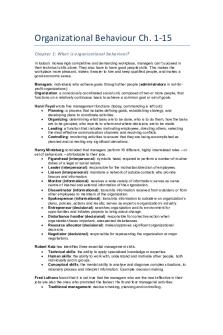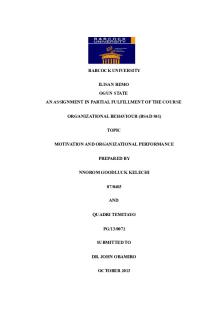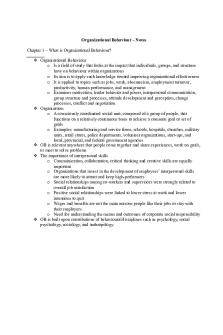Case Mcwane Video Summary - Organizational Behaviour PDF

| Title | Case Mcwane Video Summary - Organizational Behaviour |
|---|---|
| Course | Organizational Behaviour |
| Institution | University of Ottawa |
| Pages | 3 |
| File Size | 123.2 KB |
| File Type | |
| Total Downloads | 91 |
| Total Views | 144 |
Summary
Summary of the McWane video in preperation for case analysis...
Description
PART 1- A DANGEROUS BUSINESS Introduction McWane Corporation – one of the largest iron pipe companies in North America with estimated revenue of 2 billion. Workers risk their lives on the job due to many criminal violations resulting in 4,600 workers injured and nine deaths since 1995. Tyler Pipe – largest of McWane’s plant is a repeat violator of safety rules resulting in workforce burns, amputations and violent industrial accidents. Marco Lopez – dedicated worker, injures and struggling with his disability McWane way of management is increasing profits at enormous human cost through “disciplined management practice”. Safety is sacrificed to increase productivity o Motto posted on walls “Reduce man hours per ton” o Reducing the workforce by 2/3 of the people working there o Stressors: MARCOS LOPEZ: “We were tired, exhausted. We work in a real dangerous environment. There's a lot of parts moving. There's a lot of things, you know, going on.” o Extended hours (over 16 hour days) with exhausted employees o Role overload (excessive demands on employee preventing them from working effectively) o extended role responsibility o Basic human needs not respected; wouldn’t let workers break to go to bathroom o Safety-guards on dangerous equipment missing & moving machinery not stopped for repairs o Employees are seen as “warm bodies” to be replaced. 1. McWane’s record 5 years ago 60% of maintenance workers in one plant were injured. Repeatedly ignored basic safety rules set by OSHA (Occupational Safety and Health Administration) an agency of the United States Department of Labor. o The law is inadequate and penalties are very low to deal with serious repetitive violators. o Maximum penalty for someone’s death is 7000$ Management philosophy posted on walls “Reduce man hours per ton” Became “employer of last choice” and had to recruited ex-convicts from local prisons which had little experience and not trained. Rolan Hoskin was one of 9 workers killed in McWane plants since 1991, and the only one whose death would result in McWane being held criminally responsible under federal law. The company was charged with the maximum penalty, a misdemeanor, and then paid a fine of $250,000. No one was sent to jail. 2. The McWane’s way back then ROBERT RESTER “Whistle Blower” former plant manager at McWane’s Union Foundry plant 24 years at McWane rose from shop floor to become plant manager. He is a conservative southerner with a no-nonsense leadership style. On sick leave for stress and heart condition. ROBERT RESTER: “Now I'd went off sick, first time I'd been, missed a day in 25 years. And they started giving me a hard time about that and I never could understand why. And then I finally realized that they were doing to me what I've watched them do for 25 years to other people. You know, I been watching for, and waiting and watching for years and the way people got treated and I was a part of it. And, and I just, I knew for a long time that sooner or later, somebody's gonna to have to stop it, somebody's gonna have to say something. And I was always hoping it would be somebody besides me. I never knew I'd be the end up one talking or pushing the issue. But that's the point I was at.” Said he was part of an abusive management culture that placed the production of pipe above all else The company responded in writing, denying Mr. Rester's allegations: "We do not put production concerns ahead of safety and environmental compliance." Company wants public to think they care: “Safety starts with Attitude” sign outside company gate CLYDE DORN former Safety Director with 6 years working at McWane’s Union Foundry
Could not be effective on his job: o NO EXPERIENCE: never worked in foundry before or been a safety director before this job o NO AUTHORITY to stop production – had to go to plant manager who would make decision o NO BUDGET, NO STAFF Role included to fight to reduce OSHA fines on accidents such as Reginal Elston & Johnny Brewster Withheld information from federal inspectors: McWane way is “Don’t tell anybody anything” ... “you don’t convict yourself, you let them do it. That’s what they get paid for”
OSHA Washington said that “regulations have been strangling business” – after heavy lobbying by industry, OSHA’s authority and budget curtailed, making it easier for companies to ignore OSHA. CHARLES JEFFRESS Former Assistant Secretary of Labor OSHA o “You can't send someone to jail for any significant period of time for willfully violating the law and killing somebody. That's the problem. The law is inadequate.” o “They consider OSHA a mosquito. That they'd rather pay the fines than bring their plants into compliance. That they think the law is so ineffective that it's more profitable for them to take the risk by not having safety programs in place than to comply with the law. That is a serious problem.” Since OSHA was est. 32 years ago, there have been over 200,000 work related deaths and only 11 short jail sentences handed out. No public outcry to change laws and any change in law has to come from Congress where industry regulations are not popular. Enforcing the OSHA misdemeanours is not popular with prosecutors for focus on felony not misdemeanour charges. The plant deaths are declared as “accidents” and criminal charges not filed. 3. Company’s past environmental record Not only dangerous but dirty! McWane declared in violation of pollution laws and emission limits more than 450 times in the last 7 years. Violations include air pollution and waste pollution. Health Department did not react to complaints According to BART SLAWSON Environmental lawyer, McWane’s attitude is “Unless you catch us, we are not going to do anything we don’t have to do”. According to ROBERT RESTER the executive management was aware of the illegal discharge of contaminated waste water. Pollution of the Delaware River with oily sheen 8 miles long. Source is city storm drain converted to industrial sewer that was used by McWane’s Atlantic States Foundry. McWane paid $50 000 to environmental group to dispose of the case. McWane responds that it is spending millions to clean air and waste pollution. For Atlantic States Foundry alone “the company spent 5$ million to develop a self-contained water treatment system”. McWane says it is “fitting for survival competing with foreign manufacturers who have no regard for safety of works or the environment.” McWane says new company wide emphasise on safety has lowered injury rate
PART 2- A DANGEROUS BUSINESS REVISITED. 4. McWane’s Story Today (5 years later) DAVID UHLMANN who headed the Environmental Crimes Section at the Justice Department led a nationwide investigation of McWane facilities in four states. Department of Justice took action with felony charges filed against 5 McWane plants and McWane’s management for covering up crimes with lies and obstructing justice by silencing witnesses. o Convictions on 125 on environmental, health and safety crimes including violation of Clean Air Act, & Clean Water Act. o $20 million in criminal fines and more in civil penalties The McWane way was a “Culture of Lawlessness” described by the Department of Justice and “Culture of fear” describe by employees. McWane President RUFFNER PAGE welcomed opportunity to share information of the “dramatic transformation” of the company and the “New McWane Way” o 90% of the senior management is new with many of old managers forced out o 125 new environmental specialists, health safety and HR positions o New advanced computer programs to track environmental compliance and injuries o Hired Environmental Consultants, Health and Safety Attorney and OSHA Secretary o $300 Million spent on new technologies and safer factories 5. An invitation to tour McWane’s Plants Unguarded conveyer belts that were a major hazard are today secured and there are guardrails around platforms and large machinery Air in plants is much cleaner and clearer Workers claim that things have changed drastically and the way is more “safety consciousness” New strict requirements to shut down and lock down machines while they are repaired More stable workforce compared to high turnover before Management approachable and meeting workers in plants Employees feeling safer working Encourage and reward people to find things early and correct them. SAFETY: According to outside Audits the 2007 injury rate is below industry average (dramatic improvement) ENVIRONMENT: performance has improved, operating like a regular citizen of the community APOLOGY from Philip McWane in 2005 about company’s conduct. 6. Epilogue INJUSTICE: O for McWane executives only 1 did jail time and others are keeping their jobs and paychecks o ROBERT RESTER the “Whistle Blower” struck deal with prosecutors and testified against McWane. He lost a lot financially by doing the “right” thing. He became a “garbage man” with 1/5 the salary he had before. Robert Rester Personal Cost > Personal benefits Organization Costs < Organizational Benefits REQUIERED CHANGES TO THE LAW o This case has given Justice Department a new model a way around the OSHA law weakness. o It should be a felony not misdemeanor if you willfully commit a safety violation that results in a worker’s death. o According to DAVID UHLMANN who headed the Environmental Crimes Section at the Justice Department “There will always be companies that don’t think its important to comply with the law and for those companies you need a strong enforcement scheme to bring them in line and to make sure crime does not pay”...
Similar Free PDFs
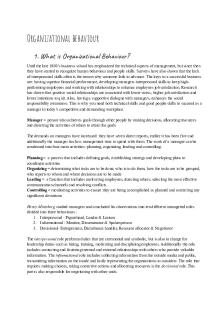
Organizational behaviour
- 67 Pages

Organizational Behaviour
- 2 Pages
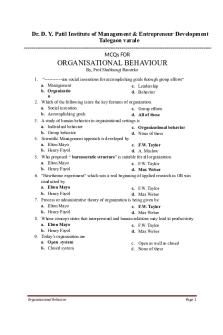
Organizational Behaviour mcqs
- 27 Pages
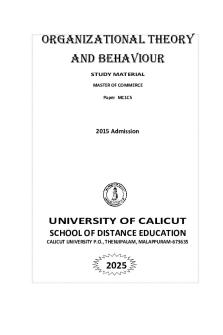
Organizational theory and behaviour
- 186 Pages
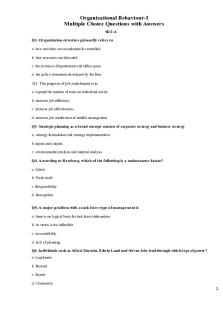
Organizational Behaviour MCQ SET
- 20 Pages
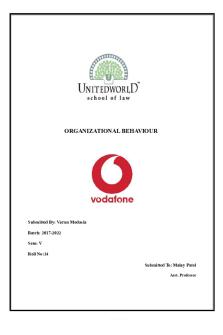
Organizational Behaviour Project
- 15 Pages
Popular Institutions
- Tinajero National High School - Annex
- Politeknik Caltex Riau
- Yokohama City University
- SGT University
- University of Al-Qadisiyah
- Divine Word College of Vigan
- Techniek College Rotterdam
- Universidade de Santiago
- Universiti Teknologi MARA Cawangan Johor Kampus Pasir Gudang
- Poltekkes Kemenkes Yogyakarta
- Baguio City National High School
- Colegio san marcos
- preparatoria uno
- Centro de Bachillerato Tecnológico Industrial y de Servicios No. 107
- Dalian Maritime University
- Quang Trung Secondary School
- Colegio Tecnológico en Informática
- Corporación Regional de Educación Superior
- Grupo CEDVA
- Dar Al Uloom University
- Centro de Estudios Preuniversitarios de la Universidad Nacional de Ingeniería
- 上智大学
- Aakash International School, Nuna Majara
- San Felipe Neri Catholic School
- Kang Chiao International School - New Taipei City
- Misamis Occidental National High School
- Institución Educativa Escuela Normal Juan Ladrilleros
- Kolehiyo ng Pantukan
- Batanes State College
- Instituto Continental
- Sekolah Menengah Kejuruan Kesehatan Kaltara (Tarakan)
- Colegio de La Inmaculada Concepcion - Cebu





